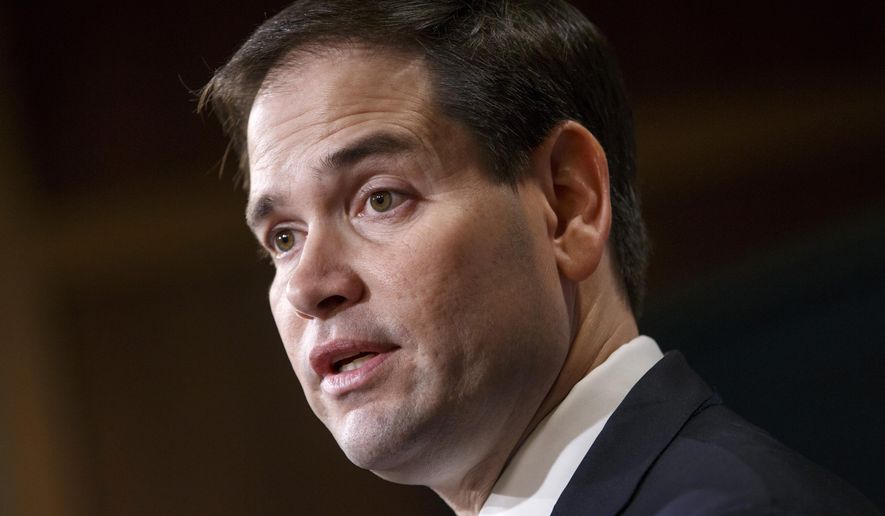Sen. Marco Rubio of Florida said Wednesday that his foreign policy credentials could give him a leg up on some of the current and former governors flirting with making bids for the 2016 Republican presidential nomination.
Mr. Rubio is openly considering running, but GOP strategists have cautioned that his path narrowed last month after former Florida Gov. Jeb Bush announced he is actively exploring a bid.
Speaking to reporters at a breakfast hosted by the Christian Science Monitor, Mr. Rubio said Mr. Bush would be a “very credible” candidate, but said the ex-governor’s decision won’t influence his.
Mr. Rubio also dismissed some Republicans’ belief that the GOP needs to nominate a governor with executive experience, saying that the next election promises to be heavy on foreign policy, and that’s an area where senators have an advantage.
“The next president of the United States needs to be someone who has a clear view of what’s happening in the world, a clear strategic vision of America’s role in it, and a clear tactical plan for how to engage America in global affairs,” said Mr. Rubio, a member of the Senate Foreign Relations Committee. “I think for governors that is going to be a challenge, at least initially, because they don’t deal with foreign policy on a daily basis.”
Mr. Rubio won election as part of the tea party wave of 2010, but came under heavy fire from grass-roots conservatives in 2013 for supporting an immigration package that provided a quick path to legalization and eventual path to citizenship for most illegal immigrants.
Since then, he has focused a lot on global affairs, becoming a chief critic of the Obama administration’s handling of Russia’s meddling in Crimea and of Islamic militants in the Middle East.
Last month, Mr. Rubio led pushback against the White House’s efforts to normalize relations with Cuba, putting him at odds with another 2016 GOP contender, Sen. Rand Paul of Kentucky, who says the embargo against the tiny island nation has not worked.
Mr. Rubio said the focus on foreign policy is natural.
“I believe the central obligation of the federal government … is proving for the national security,” he said. “You can’t have middle-class prosperity if your national security is threatened. You can’t have economic growth if your economic security is being threatened.”
On immigration, Mr. Rubio said he still believes the system is broken but the 2013 fight proved that it must be fixed piece-by-piece, as House Republicans have said they would do. He said the first pieces should be strengthening border security and modernizing legal immigration, including moving to a more merit-based system for admitting future immigrants.
The moves, he said, could create a friendlier environment for handling the millions of illegal immigrants here now.
“Most people understand that most of them are going to be here for the rest of their lives,” he said.
• Seth McLaughlin can be reached at smclaughlin@washingtontimes.com.




Please read our comment policy before commenting.